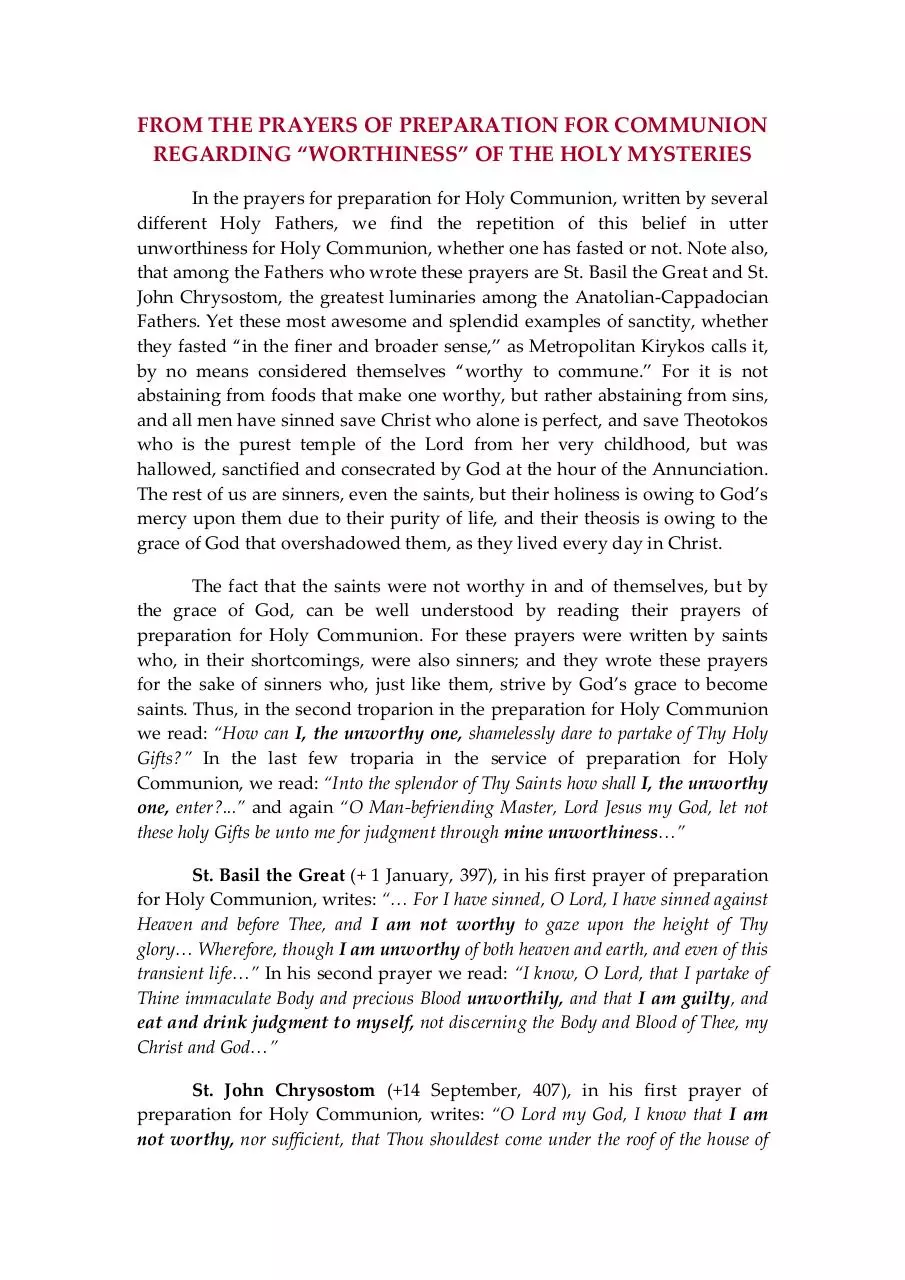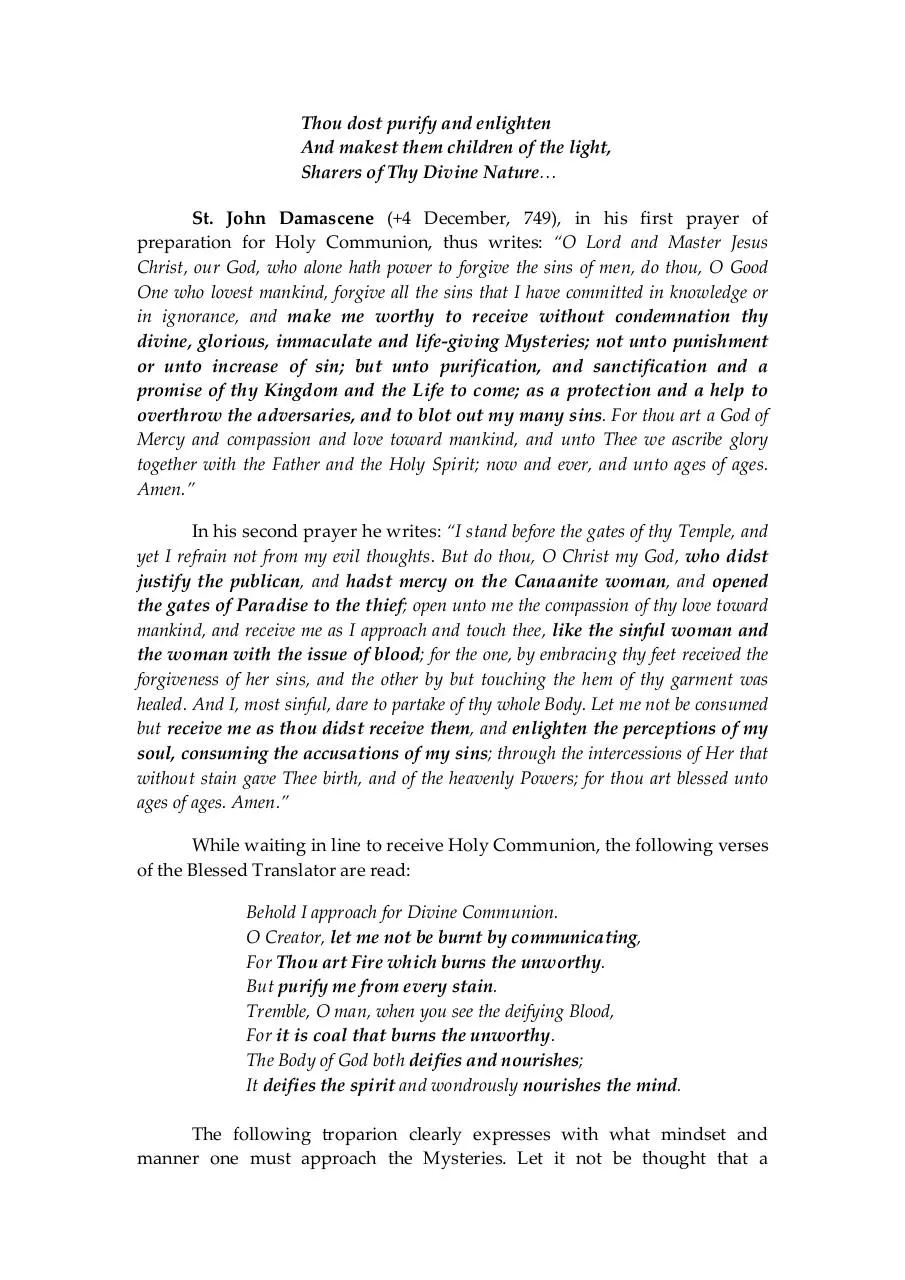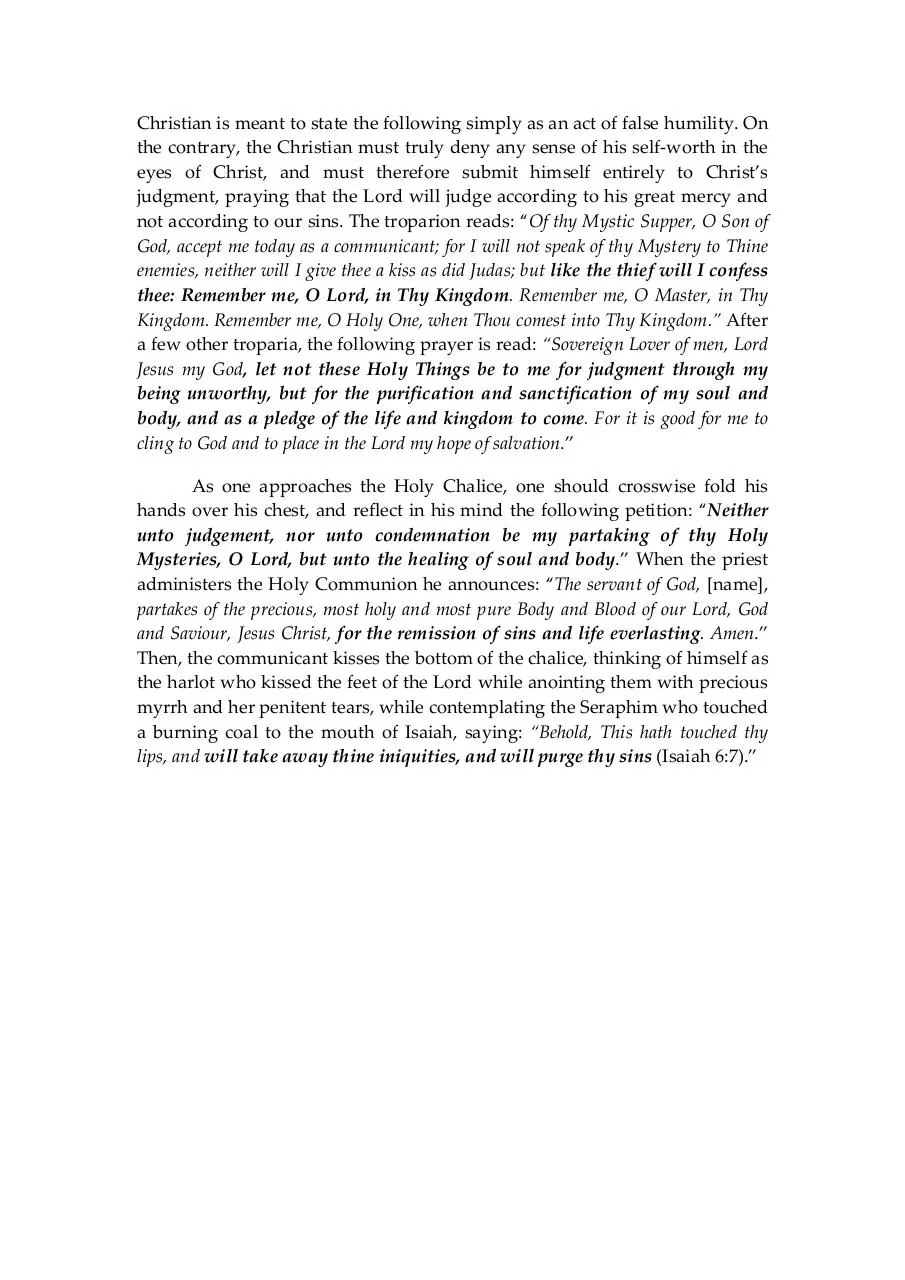contracerycii05 (PDF)
File information
Title: FROM THE PRAYERS OF PREPARATION FOR COMMUNION REGARDING “WORTHINESS†OF THE HOLY MYSTERIES
Author: Stavros
This PDF 1.4 document has been generated by Acrobat PDFMaker 8.1 for Word / Acrobat Distiller 8.1.0 (Windows), and has been sent on pdf-archive.com on 23/09/2014 at 09:21, from IP address 46.176.x.x.
The current document download page has been viewed 741 times.
File size: 188.72 KB (5 pages).
Privacy: public file





File preview
FROM THE PRAYERS OF PREPARATION FOR COMMUNION
REGARDING “WORTHINESS” OF THE HOLY MYSTERIES
In the prayers for preparation for Holy Communion, written by several
different Holy Fathers, we find the repetition of this belief in utter
unworthiness for Holy Communion, whether one has fasted or not. Note also,
that among the Fathers who wrote these prayers are St. Basil the Great and St.
John Chrysostom, the greatest luminaries among the Anatolian‐Cappadocian
Fathers. Yet these most awesome and splendid examples of sanctity, whether
they fasted “in the finer and broader sense,” as Metropolitan Kirykos calls it,
by no means considered themselves “worthy to commune.” For it is not
abstaining from foods that make one worthy, but rather abstaining from sins,
and all men have sinned save Christ who alone is perfect, and save Theotokos
who is the purest temple of the Lord from her very childhood, but was
hallowed, sanctified and consecrated by God at the hour of the Annunciation.
The rest of us are sinners, even the saints, but their holiness is owing to God’s
mercy upon them due to their purity of life, and their theosis is owing to the
grace of God that overshadowed them, as they lived every day in Christ.
The fact that the saints were not worthy in and of themselves, but by
the grace of God, can be well understood by reading their prayers of
preparation for Holy Communion. For these prayers were written by saints
who, in their shortcomings, were also sinners; and they wrote these prayers
for the sake of sinners who, just like them, strive by God’s grace to become
saints. Thus, in the second troparion in the preparation for Holy Communion
we read: “How can I, the unworthy one, shamelessly dare to partake of Thy Holy
Gifts?” In the last few troparia in the service of preparation for Holy
Communion, we read: “Into the splendor of Thy Saints how shall I, the unworthy
one, enter?...” and again “O Man‐befriending Master, Lord Jesus my God, let not
these holy Gifts be unto me for judgment through mine unworthiness…”
St. Basil the Great (+ 1 January, 397), in his first prayer of preparation
for Holy Communion, writes: “… For I have sinned, O Lord, I have sinned against
Heaven and before Thee, and I am not worthy to gaze upon the height of Thy
glory… Wherefore, though I am unworthy of both heaven and earth, and even of this
transient life…” In his second prayer we read: “I know, O Lord, that I partake of
Thine immaculate Body and precious Blood unworthily, and that I am guilty, and
eat and drink judgment to myself, not discerning the Body and Blood of Thee, my
Christ and God…”
St. John Chrysostom (+14 September, 407), in his first prayer of
preparation for Holy Communion, writes: “O Lord my God, I know that I am
not worthy, nor sufficient, that Thou shouldest come under the roof of the house of
my soul, for all is desolate and fallen, and Thou hast not in me a place worthy to
lay Thy head…” In his third prayer we read: “O Lord Jesus Christ my God, loose,
remit, forgive, and pardon the failings, faults, and offences which I, Thy sinful,
unprofitable, and unworthy servant have committed from my youth, up to the
present day and hour…”
If in any place in the prayers of preparation for Holy Communion there
is a statement of worthiness within man, it is claimed that Christ and the
Mysteries themselves are the source of that worthiness. By no means are
mankind’s own works, such as fasting, considered to make one worthy. Thus,
Blessed Chrysostom writes: “I believe, O Lord, and I confess that thou art truly the
Christ, the Son of the living God, who didst come into the world to save sinners,
of whom I am chief. And I believe that this is truly Thine own immaculate Body,
and that this is truly Thine own precious Blood. Wherefore I pray thee, have mercy
upon me and forgive my transgressions both voluntary and involuntary, of word and
of deed, of knowledge and of ignorance; and make me worthy to partake without
condemnation of Thine immaculate Mysteries, unto remission of my sins and
unto life everlasting. Amen.”
St. Symeon the Translator (+9 November, c. 950) writes: “…O Christ
Jesus, Wisdom and Peace and Power of God, Who in Thy assumption of our nature
didst suffer Thy life‐giving and saving Passion, the Cross, the Nails, the Spear, and
Death, mortify all the deadly passions of my body. Thou Who in Thy burial
didst spoil the dominions of hell, bury with good thoughts my evil schemes and
scatter the spirits of wickedness. Thou Who by Thy life‐giving Resurrection on the
third day didst raise up our fallen first Parent, raise me up who am sunk in sin
and suggest to me ways of repentance. Thou Who by Thy glorious Ascension
didst deify our nature which Thou hadst assumed and didst honor it by Thy session at
the right hand of the Father, make me worthy by partaking of Thy holy
Mysteries of a place at Thy right hand among those who are saved. Thou Who
by the descent of the Spirit, the Paraclete, didst make Thy holy Disciples worthy
vessels, make me also a recipient of His coming. Thou Who art to come again to
judge the World with justice, grant me also to meet Thee on the clouds, my
Maker and Creator, with all Thy Saints, that I may unendingly glorify and praise
Thee with Thy Eternal Father and Thy all‐holy and good and life‐giving Spirit, now
and ever, and to the ages of ages. Amen.”
St. Symeon the New Theologian (+12 March, 1022) wrote a poem that
clearly explains how a communicant must regard himself as utterly unworthy
to receive the Holy Body and Blood of the Lord, and entirely hope in God’s
mercy:
From sullied lips,
From an abominable heart,
From an unclean tongue,
Out of a polluted soul,
Receive my prayer, O my Christ.
Reject me not,
Nor my words, nor my ways,
Nor even my shamelessness,
But give me courage to say
What I desire, my Christ.
And even more, teach me
What to do and say.
I have sinned more than the harlot…
And all my sins
Take from me, O God of all,
That with a clean heart,
Trembling mind
And contrite spirit
I may partake of Thy pure
And all‐holy Mysteries
By which all who eat and drink Thee
With sincerity of heart
Are quickened and deified…
Therefore I fall at Thy feet
And fervently cry to Thee:
As Thou receivedst the Prodigal
And the Harlot who drew near to Thee,
So have compassion and receive me,
The profligate and the prodigal,
As with contrite spirit
I now draw near to Thee.
I know, O Saviour, that no other
Has sinned against Thee as I,
Nor has done the deeds
That I have committed.
But this again I know
That not the greatness of my offences
Nor the multitude of my sins
Surpasses the great patience
Of my God,
And His extreme love for men.
But with the oil of compassion
Those who fervently repent
Thou dost purify and enlighten
And makest them children of the light,
Sharers of Thy Divine Nature…
St. John Damascene (+4 December, 749), in his first prayer of
preparation for Holy Communion, thus writes: “O Lord and Master Jesus
Christ, our God, who alone hath power to forgive the sins of men, do thou, O Good
One who lovest mankind, forgive all the sins that I have committed in knowledge or
in ignorance, and make me worthy to receive without condemnation thy
divine, glorious, immaculate and life‐giving Mysteries; not unto punishment
or unto increase of sin; but unto purification, and sanctification and a
promise of thy Kingdom and the Life to come; as a protection and a help to
overthrow the adversaries, and to blot out my many sins. For thou art a God of
Mercy and compassion and love toward mankind, and unto Thee we ascribe glory
together with the Father and the Holy Spirit; now and ever, and unto ages of ages.
Amen.”
In his second prayer he writes: “I stand before the gates of thy Temple, and
yet I refrain not from my evil thoughts. But do thou, O Christ my God, who didst
justify the publican, and hadst mercy on the Canaanite woman, and opened
the gates of Paradise to the thief; open unto me the compassion of thy love toward
mankind, and receive me as I approach and touch thee, like the sinful woman and
the woman with the issue of blood; for the one, by embracing thy feet received the
forgiveness of her sins, and the other by but touching the hem of thy garment was
healed. And I, most sinful, dare to partake of thy whole Body. Let me not be consumed
but receive me as thou didst receive them, and enlighten the perceptions of my
soul, consuming the accusations of my sins; through the intercessions of Her that
without stain gave Thee birth, and of the heavenly Powers; for thou art blessed unto
ages of ages. Amen.”
While waiting in line to receive Holy Communion, the following verses
of the Blessed Translator are read:
Behold I approach for Divine Communion.
O Creator, let me not be burnt by communicating,
For Thou art Fire which burns the unworthy.
But purify me from every stain.
Tremble, O man, when you see the deifying Blood,
For it is coal that burns the unworthy.
The Body of God both deifies and nourishes;
It deifies the spirit and wondrously nourishes the mind.
The following troparion clearly expresses with what mindset and
manner one must approach the Mysteries. Let it not be thought that a
Christian is meant to state the following simply as an act of false humility. On
the contrary, the Christian must truly deny any sense of his self‐worth in the
eyes of Christ, and must therefore submit himself entirely to Christ’s
judgment, praying that the Lord will judge according to his great mercy and
not according to our sins. The troparion reads: “Of thy Mystic Supper, O Son of
God, accept me today as a communicant; for I will not speak of thy Mystery to Thine
enemies, neither will I give thee a kiss as did Judas; but like the thief will I confess
thee: Remember me, O Lord, in Thy Kingdom. Remember me, O Master, in Thy
Kingdom. Remember me, O Holy One, when Thou comest into Thy Kingdom.” After
a few other troparia, the following prayer is read: “Sovereign Lover of men, Lord
Jesus my God, let not these Holy Things be to me for judgment through my
being unworthy, but for the purification and sanctification of my soul and
body, and as a pledge of the life and kingdom to come. For it is good for me to
cling to God and to place in the Lord my hope of salvation.”
As one approaches the Holy Chalice, one should crosswise fold his
hands over his chest, and reflect in his mind the following petition: “Neither
unto judgement, nor unto condemnation be my partaking of thy Holy
Mysteries, O Lord, but unto the healing of soul and body.” When the priest
administers the Holy Communion he announces: “The servant of God, [name],
partakes of the precious, most holy and most pure Body and Blood of our Lord, God
and Saviour, Jesus Christ, for the remission of sins and life everlasting. Amen.”
Then, the communicant kisses the bottom of the chalice, thinking of himself as
the harlot who kissed the feet of the Lord while anointing them with precious
myrrh and her penitent tears, while contemplating the Seraphim who touched
a burning coal to the mouth of Isaiah, saying: “Behold, This hath touched thy
lips, and will take away thine iniquities, and will purge thy sins (Isaiah 6:7).”
Download contracerycii05
contracerycii05.pdf (PDF, 188.72 KB)
Download PDF
Share this file on social networks
Link to this page
Permanent link
Use the permanent link to the download page to share your document on Facebook, Twitter, LinkedIn, or directly with a contact by e-Mail, Messenger, Whatsapp, Line..
Short link
Use the short link to share your document on Twitter or by text message (SMS)
HTML Code
Copy the following HTML code to share your document on a Website or Blog
QR Code to this page

This file has been shared publicly by a user of PDF Archive.
Document ID: 0000185270.